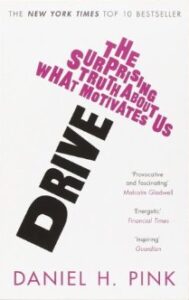
We believe, based on our experience and decades of research, that there is a type of culture, which provides higher productivity, stronger motivation and dedication. It is not the classic “crunch-time” culture we see in most organisations.
This post aims at explaining how organisations can achieve better results in less time and with higher quality.
If you want to know more about the background and how our journey lead us to the conclusions below, read about it in my other blog post about culture as the new work order .
Everyone in a company must strive to be successful. Everything we do, all decisions we make add up towards the success of the company. The good news is – people want to be productive, they are naturally driven to work towards a goal.
This often is forgotten when talking about culture. Which is a problem. Conversations then tend to get an idealistic spin, actions are taken without keeping the success of the company as the core objective, and the result is a counter-productive culture. Even if well implemented, this flavour of culture does not do good to the company and, not surprisingly, also does not motivate to those that work in it.

Delivery is everything
The key to a successful and productive company, are motivated people. Research shows that, in order to have motivated knowledge workers, an organisation needs to provide them with autonomy, mastery, and purpose.
Additionally, as we want to constantly and continuously deliver real value and real products extremely fast to the market, we focus on lean operations. These approaches, including DevOps and product development flow, continuous improvement, etc. have at their core the respect for people. This is the real driver of motivation (and commitment).
It is possible to motivate knowledge workers with more money, but only up to a certain point. That point is reached when the “money concerns” for the individual come off the table (this has been researched multiple times across the world). Motivation after this point can only happen intrinsically, i.e. from inside the individual. This means that there is no direct lever to motivation, only indirect ones. The task for the Management after this point moves from providing direct incentives to providing the environment for motivation to grow within individuals. Research shows that this environment can be described in the following way:
Give employees control over their environment, what they work on, whom they work with, where and when they work.
Give employees a way to become masters of their craft. This includes training, conferences, etc. but also includes leeway to spend work hours reading, or simply practicing, not just always building direct value.
Now that you have given them a way to become masters, support them while they walk it. Employees who feel like they are just workers in a factory rapidly lose motivation. If instead they feel like their managers have a stake in their growth, they rapidly gain motivation.
Give employees a reason to be here. Paint a picture of why their job is important; why they are important.
 Drive: The Surprising Truth About What Motivates Us (Autonomy, Mastery, Purpose) by Daniel Ping
Drive: The Surprising Truth About What Motivates Us (Autonomy, Mastery, Purpose) by Daniel Ping
This pays into autonomy. When people get to choose where they work, what they work on, and whom they work with, it provides an immediate and measurable motivation boost.
Sometimes work demands extra dedication, e.g. during a server outage. Sometimes life demands extra dedication, e.g. when a family member gets sick. When stressful events outside work constantly demand attention from the employee, they are less productive. We accept this reality and allow our people to master the balance themselves.
30-40 hours per week is a well-researched pace which most humans can maintain almost indefinitely. This applies only considering they do not have a lot of private and other non-work responsibilities.
If you go above this, you will initially gain slightly more productivity, but almost immediately you will lose it again, resulting only in more problem than before (see appendix).

Decentralised decisions are the key to working efficiently and a requirement to deliver fast in highly dynamic and rapidly changing environments.
The classic hierarchical organisational structure is very strong in solving low-dynamic-problems (in most environments this is limited to people management, alignment with core business goals, vision, mission and values). They fall short when the organisational context becomes rapidly changing.
Organising and orchestrating work amongst departments and making centralised (hippo- or highest-paid-person’s-opinion-based) decisions on operational topics are prone to fail. Instead, we want to work in an integrated and cross-functional way and make decisions as close to the operational work as possible.
Empowerment therefore is crucial on all levels.
We strengthen dynamic-robust aspects of our culture when we worship non-hierarchical and integrated behaviour, as well as ownership and responsibility.
Our employees need to innovate and create. Research has shown that high facetime (too much time) spent in front of the computer in the office-environment has a negative impact on creativity.
Instead, people tend to be more creative when they gain distance from the problems they are trying to solve (after getting stuck in them).
Creativity happens when you converse with new people and experience new things.
We therefore believe that people need room to let creativity bloom.
This relates to the amount of working hours, facetime in the office (vs home office, free time, remote work).
We believe that it is more important to increase the effectiveness of the team than to increase the team’s size or working hours. This can be achieved through retrospecting, inspecting, adopting, coaching – striving for continuous improvement. In fact, every time we increase the team’s size and individual workload, effectiveness is reduced.
It is a well-researched fact that diversity within a team leads to better results.
Most companies today should agree on being multinational and on English as their primary language.
We must strive to hire people that bring new aspects, new cultural insights and learnings and that are better than us (in something).
We must value part-time work. This allows us to hire people who might not be available full-time, opening the door to certain types of experts or people with a niche set of skills. This will directly increase the diversity of the team, as currently that is more likely to be women or parents in general.
This also pays directly into autonomy. When people get the feeling they are measured by their impact and not by the amount of time their seat is occupied, their feeling of worth skyrockets, leading to high motivation.

Strive for a culture that values delivery and output/outcome, not working hours.
We believe that the continued/regular need for extended working time is an indicator for bad time management, missing focus, inefficient environment, insufficient skills and you should value fixing inefficiencies problems higher than managing the symptoms.
The competition between employers is extremely high for the kind of employees we strive to hire. Therefore, most of the aspects of our culture are not only a way to stand out from the crowd, but also aspects that prospective hires demand/expect from an organisation. If we are to retain and attract talent, we must stay competitive.
This includes all of the above and more. The bar is high. For example, 30 days of holidays as a plus has now become a standard and not an extra. Perks like food, drinks, health, entertainment, social gatherings, conferences and the like are expected and not something to put proudly in your job ad.
Looking forward, we strongly believe that the work models will shift significantly. Employer-employee relationships will need to be redesigned. The current work models are permanent employment (where worker time is sold for a price and risk cover is added from the employer in the form of social security payments, retirement plans, etc.) and freelance agreements (where worker time is sold at a higher price, but risk lies with the worker). These are rather simplistic in the way they equate people (the valuable knowledge workers that bring the success of the organisation, the only means of generating revenue) as monetary risk.
We believe that the future work models must find a better balance between freedom and support/risk assumption. On one hand, they need to allow a lot more flexibility for the employee than today’s permanent arrangements in terms of how work is organised. However, they will also need to provide more reliability and commitment for both the employer and the employee than today’s freelance agreements. The future work agreements will need to be based on trust, commitment and outcome instead of hours. They need to be geared towards providing the right environment for the desired outcome to be delivered. These work agreements need to be as strong as the work relationship needs to be. At the end, there needs to be a better alignment and mutual support between the paper and the psychological work contract.
We still do not have all the answers, but we welcome the current dynamics fuelled by COVID-19. If there is one good thing resulting from the first big crisis in this millennium, it will be this: we have a global test of our cultural habits and we will learn from it. We have a chance to see which aspects of the culture are indispensable, and even more importantly: which aspects we thought were dispensable, are actually hindering or boosting success.
Any culture has its challenges. Our culture shares many challenges with other cultures, including how to provide direction, how to be good leaders and managers, and more.
Even the challenge of coordinating people is not uniquely connected to flexible, remote or part-time work. In a “crunch-time” culture, we would still need to solve coordination and collaboration issues, let alone dealing with vacation, sick days, and absenteeism due to … well – crunch time. Flexible, remote and part-time work does not make this more difficult, it – in fact – makes it easier. Dealing with coordination challenges becomes the norm rather than a deviation, and so it becomes a core aspect of our culture.
Additionally, due to our focus on continuous improvement, our team members themselves take responsibility for coordinating their own absences with their teams. This leads directly to more collective responsibility, which leads to more motivation and to better results.
There is however one important challenge which we do not share with a classic “crunch-time” culture. Motivation. We do not need to motivate our people. They are intrinsically motivated. This is a direct result of our culture. We show them that we respect them and support them. In return, they give us incredible focus and dedication. This is not measured in terms of “hours of butts in seats” but in terms of direct business results.
In the end, this is the only thing that really matters.
No matter what we do at Zeile7 , how we create value for our customers, we are always involved in cultural matters. And in the end each gig – from high level support to hands-on coding – involves an aspect of cultural change that we actively manage.
Culture matters. Already back in 2014, I started to realise that the way we were working – co-located in big offices, big offices located in big cities, poisoned by big office-culture – did not have a future. If you want to know more about my journey to reach this conclusion, read my other blog post about culture as the new work order .

In professional sports, in order to reach the highest heights of success, teams build extraordinary focus. They fight for their goals, and make (personal) sacrifices in order to achieve them.
However, they also are not driven like slaves. They and their coaches and managers know that they must stay healthy, mentally and physically, which means not too many hours, no isolation from family, plenty of time to socialise when needed, etc. i.e. a healthy balance.
However the driving factor is the goal to succeed, while the enabling factor is the goal of having a good balance.
The professional team has the overall goal of success, with the enabling goal of healthy players.
If there is an emphasis on hours worked, rather than results produced, there is little incentive for individual employees to think rigorously about whether they are using their time wisely.